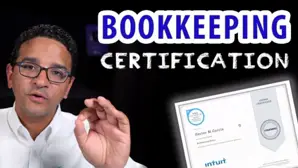How to become a bookkeeper?
Do you want to be the key to a business’s financial success? Or how to become a bookkeeper? A career as a bookkeeper might be perfect for you. With the right knowledge and skills, you can build a stable and thriving career. Explore the journey to becoming a professional bookkeeper today with us.

Being a bookkeeper is a job that requires the appropriate skills and qualifications.
Types of bookkeeping
There are several types of bookkeeping services available, depending on the level of time and financial commitment you're willing to make. Here are some common bookkeeping options:
- DIY: If you’re comfortable with numbers and spreadsheets, you might opt to handle bookkeeping yourself. However, it’s important to consider how time-intensive it can be, which may take away from other business duties.
- Bookkeeping software: Many business owners use intuitive software to manage their bookkeeping. These tools simplify the process and make it easier to track finances.
- Remote or virtual bookkeeper: A remote or virtual bookkeeper works entirely online, offering a convenient and cost-effective solution. For example, online users can seek assistance from experts for help with managing and updating their financial records.
- Bookkeeping and accounting firm: A firm can offer a comprehensive range of services, such as bookkeeping, accounting, tax preparation, payroll, and consulting. Often, bookkeepers and certified public accountants (CPAs) collaborate within the same firm.
- In-house professional: You can also hire a full-time or part-time employee to manage your bookkeeping. While this option may be more expensive, it provides dedicated, on-site support for your financial needs.

A bookkeeper is responsible for supporting effective business management
The benefits of a bookkeeper in the company
Performance assessment:
- Understanding business performance: Helps businesses evaluate their operational effectiveness over a specific period.
- Identifying strengths and weaknesses: Allows businesses to pinpoint what they are doing well and areas that need improvement.
- Comparing periods: Comparing financial results across different periods helps businesses recognize development trends and make informed decisions.
Future preparation:
- Planning: Financial records provide essential data for effective business planning.
- Decision-making: Based on the information from the records, businesses can make informed decisions about investments, business expansion, and more.
- Risk mitigation: Helps businesses anticipate and avoid potential risks in the future.
Managing cash flow:
- Controlling inflows and outflows: Enables businesses to closely monitor cash flow, ensuring there is enough money to cover debts and operational expenses.
- Preventing cash shortages: Helps avoid cash shortages that could impact business operations.
- Optimizing cash flow: Assists businesses in finding ways to optimize cash flow and improve capital efficiency.
< b>Inventory management:
- Inventory control: Helps businesses keep track of inventory levels, preventing overstocking or stock shortages.
- Cost reduction: Aids in reducing storage costs and expenses related to holding inventory for extended periods.
- Improving customer service: Ensures sufficient stock to meet customer demands, enhancing service quality.
Accurate information:
- Providing reliable data: Financial records offer accurate and trustworthy financial information for decision-making.
- Supporting decision-making: Helps businesses make sound decisions based on actual data.
- Increasing transparency: Enhances transparency in business management, fostering trust with partners and investors.
Quicker preparation of financials:
- Saving time: Maintaining complete and accurate records allows businesses to prepare financial reports more quickly and easily.
- Compliance: Ensures that businesses adhere to financial reporting regulations.
- Supporting audits: Facilitates the auditing process, saving time and reducing costs.

Benefits of having a bookkeeper
How to become a bookkeeper?
Step 1: Decide whether you want to work
One of the first decisions you'll need to make is whether you want to work as a freelance bookkeeper from home or as an employee for a company.
Being your boss
- Flexibility: You have the freedom to choose your working hours and operate from any location with internet access.
- Income Potential: You can earn more per hour than working for a company, but there's also more risk and uncertainty.
- Challenges: You'll need to find and manage your clients, handle marketing and sales, and manage your finances.
Working as an employee
- Stability: You'll have a regular income and benefits.
- Learning opportunities: You can learn from experienced bookkeepers and gain valuable skills.
- Challenges: You may have less flexibility in terms of hours and workload.

Step 1: Decide whether you want to work
Step 2: Gain bookkeeping skills
- Take bookkeeping courses: Many community colleges and online platforms offer bookkeeping courses.
- Use online resources: There are numerous free and paid online resources available to learn bookkeeping.
- Practice: The best way to learn bookkeeping is to practice. You can use free accounting software like Wave or QuickBooks Online to practice on your own.
Step 3: Gain practical bookkeeping experience
Finding work as an employee
- Network: Attend industry events and connect with other bookkeepers.
- Use online job boards: Websites like Indeed and LinkedIn are great places to find bookkeeping job listings.
- Reach out to small businesses: Many small businesses need bookkeeping help.
Finding clients for your bookkeeping business
- Network: Participate in industry events and build connections with other professionals.
- Use online platforms: Websites like Upwork and Fiverr can help you find clients.
- Create a website and social media presence: This will help you showcase your skills and attract clients.

Step 3: Gain practical bookkeeping experience
Step 4: Explore bookkeeping certifications
Although not always mandatory, acquiring a bookkeeping certification can enhance your competitiveness in the job market. Some well-regarded certifications are:
- Certified Bookkeeper (CB): Provided by the American Institute of Professional Bookkeepers.
- Certified Payroll Professional (CPP): Offered by the American Payroll Association.
By completing these steps, you'll acquire the necessary skills and experience to thrive as a bookkeeper.
How do you get a bookkeeping certificate?
To obtain a bookkeeping certificate, you can enroll in various certification programs offered by organizations like the National Association of Certified Public Bookkeepers (NACPB) or the American Institute of Professional Bookkeepers (AIPB).
For a Certified Public Bookkeeper (CPB) designation through the NACPB, you need to finish the Accounting Fundamentals course and pass the Uniform Bookkeeping Certification exam.
To qualify for the Certified Bookkeeper (CB) program by the AIPB, you should be a practicing bookkeeper or have at least one year of accounting education. The CB program involves self-study workbooks designed to help you succeed in the CB exam.
Furthermore, you can explore certification options from platforms like Coursera, Udemy, LinkedIn Learning, and others. These programs often issue certificates upon course completion. While some resources are budget-friendly or even free, others may offer more comprehensive knowledge at a higher cost.

How to become a bookkeeper? How do you get a bookkeeping certificate?
What jobs can you pursue with a bookkeeping certificate?
A bookkeeping certificate can qualify you for several roles. Here are some potential job opportunities:
- Bookkeeper: Manage day-to-day financial transactions, maintain financial records, and prepare basic financial reports.
- Accountant: Manages budgets and financial documents, often specializing in areas like taxation or auditing to enhance organizational efficiency and cost management.
- Budget analyst: Develops and manages long-term budgets, ensuring departmental spending aligns with financial plans.
- Financial managers: Advise on investments by analyzing economic trends and company finances, helping both individuals and businesses make informed financial decisions.
- Payroll processing manager: Focus on processing employee payroll, managing deductions, and ensuring compliance with payroll regulations.
- Administrative assistant: Perform bookkeeping tasks as part of broader administrative responsibilities, such as managing office finances and handling bookkeeping software.
- Internal auditor: Reviews business procedures and ensures compliance with laws, offering recommendations to improve risk management and internal controls.
- Freelance bookkeeper: Offer bookkeeping services to small businesses or individuals on a freelance or contract basis.

Jobs can you pursue with a bookkeeping certificate
Become a bookkeeper from home
The process of becoming a bookkeeper and starting your own virtual bookkeeping business is more accessible than ever, and this guide illustrates just how straightforward it can be. Many of the skills required to succeed in bookkeeping can be learned and honed from the comfort of your home, without the need for formal education or a traditional office setting.
If you're motivated by the idea of being your boss and managing a flexible work schedule, bookkeeping offers a great opportunity to build a thriving business. Even if you're still exploring whether this career path is the right fit for you, this guide offers detailed insights and practical steps on how to get started. It covers everything from the essential skills and certifications needed, to how to attract clients and manage the financial aspects of running a virtual bookkeeping business.
Whether you're pursuing this as a side hustle or a full-time endeavor, the resources and advice provided will help you make informed decisions every step of the way.
Conclusion
How to become a bookkeeper? Can multiple degrees help you find a job more easily? Achieving a bookkeeping certification can open up various career opportunities, including roles such as bookkeeper, accounting clerk, or payroll specialist. We hope this article helps you gain a better understanding of these career paths and prepares you more effectively for your future career journey.
Aniday's HR Services
Headhunting Service
Find and recruit quality candidates in just 1 week! Supported by 40,000 experienced headhunters in IT, Finance, Marketing… capable of recruiting in any region.
Headhunting Service ➔Employer of Record (EOR) Service
On behalf of your business, we recruit employees and handle payroll without the need to establish a company in markets such as Vietnam, Singapore, Malaysia, India, Indonesia…
Employer of Record (EOR) Service ➔